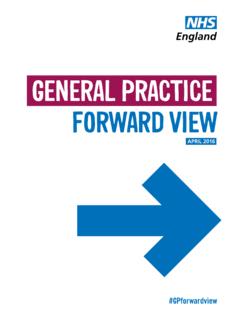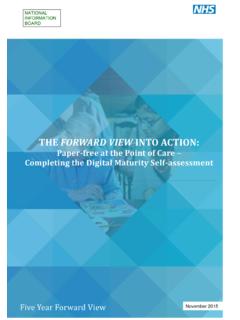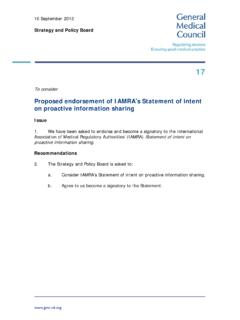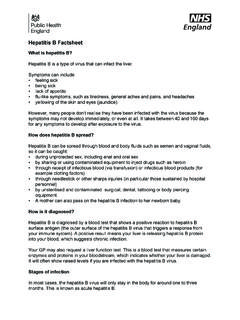Transcription of The Triangle of Care - NHS England
1 The Triangle of CareCarers Included: A Guide to Best Practice for Dementia CarePerson with dementiaProfessionalCarerKindly supported byThe Triangle of care Carers Included: A Guide to Best Practice for Dementia CareAcknowledgementsThe creation of the Triangle of care has taken many years and involved many people. It celebrates a developing awareness of carers needs and demonstrates that in different parts of the UK those people who work with and on behalf of carers are creating excellent resources and better original impetus to identify ways of improving engagement between professionals and carers grew from a training programme created by carers in Devon. Similar initiatives grew in other places. The work of Lu Duhig in avon and wiltshire influenced this resource in many through the RCN Foundation, the recent development of a Triangle of care for dementia has been a collaborative effort between the Royal College of Nursing and Carers Trust.
2 It has been co-designed with carers, people with dementia and practitioners, with the support of Uniting Carers and Dementia acknowledge the thought and effort which has gone into creating the best practice examples and are grateful for the generosity of carer and dementia champions in responding to requests to make them widely development of a new Triangle of care for dementia has been developed in recognition of the need to improve carer involvement in hospital settings, but its application is relevant across all would like to thank Alan Worthington and Malcolm Rae who have generously offered their experience and support. Thanks also to Joy Watkins and Nikki Mills for facilitating and co-ordinating the workshop that informed this would particularly like to thank the following people for their help with the research and contributions of quotes for this new guide: Kate Harwood, Norms McNamara, Barbara Hodkinson, Steve Milton, June Hennell, Peter Ashley and Frank Hannan Carers TrustRachel Thompson Royal College of NursingAlan Worthington, Carer Advisor to The Triangle of care : Carers Included: A Guide to Best Practice in Acute mental health care (The Princess Royal Trust for Carers, 2010)Paul Rooney, National Acute care Programme, Advisor to The Triangle of care : Carers Included: A Guide to Best Practice in Acute mental health care (The Princess Royal Trust for Carers, 2010)The development of this guide has been kindly funded by the RCN byCarers Trust32 36 Loman Street, London SE1 0 EHTel: 0300 772 9600 Email: Website.
3 Trust is a registered charity in England and Wales (1145181) and in Scotland (SC042870). Registered as a company limited by guarantee in England and Wales No. 7697170. Registered office: 32 36 Loman Street, London SE1 0EH. Carers Trust 20161 Contents Foreword 2 Executive summary 3 Introduction 5 The rationale behind the key standards 11 Appendix 1: Triangle of care self-assessment tool 22 References 332 The Triangle of care Carers Included: A Guide to Best Practice for Dementia CareForewordCarers Trust and the Royal College of Nursing are delighted to have been able to explore an adaptation of the Triangle of care project to meet the needs of carers of people with dementia in acute hospitals. This collaborative project developed through the support of carers, people with dementia and professionals.
4 The Triangle of care model of carer inclusion and support has proved to be very successful in mental health services with over three quarters of mental health providers in England involved in the project and the model being adapted for use in Scotland and Wales. We hope the new guide for best practice in dementia care can lead to consistent carer involvement and support across all health and social care services irrespective of where and when a person is being treated. The partnership between Carers Trust and the Royal College of Nursing has been incredibly positive and we hope that this can be replicated across health services with nurses and carers working as Scott-Spicer, Chief Executive, Carers Trust and Stephanie Aiken, Deputy Director of Nursing, RCNA bout Carers TrustCarers Trust is a major charity for, with and about carers. We work to improve support, services and recognition for anyone living with the challenges of caring, unpaid, for a family member or friend who is ill, frail, disabled or has mental health or addiction do this with a UK wide network of quality assured independent partners, through our unique online services and through the provision of grants to help carers get the extra help they need to live their own lives.
5 With these locally based Network Partners we are able to support carers in their homes through the provision of replacement care , and in the community with information, advice, emotional support, hands on practical help and access to much needed breaks. We offer specialist services for carers of people of all ages and conditions and a range of individually tailored support and group the Royal College of NursingThe Royal College of Nursing is the world s largest nursing union and professional body. We represent more than 435,000 nurses, student nurses, midwives and health care assistants in the UK and the RCN FoundationThe RCN Foundation was set up in 2010 to support the nursing community. The charity funds individuals and organisations to undertake courses, projects and activities to make improvements and innovations in nurse led care for the benefit of their patient base and the wider public. The Foundation is proud to support the development of this guide in partnership with Carers Trust and the Royal College of Nursing.
6 At a time when the numbers of people being affected by dementia is rising, this invaluable guide has never been more needed. Deepa Korea, Head of the RCN Foundation3 Executive summaryThe Triangle of care describes a therapeutic relationship between the person with dementia (patient), staff member and carer that promotes safety, supports communication and sustains the Triangle of care was originally developed for use in mental health services, the standards outlined below have been found applicable in other care settings. This guide demonstrates how these standards can be used to support a partnership approach to dementia care , particularly in hospital Triangle of care for Dementia describes how meaningful involvement and inclusion of carers can lead to better care for people with dementia. In an ideal situation the needs of the carer and the person with dementia are both met. Inclusion of people with dementia and support in making decisions is therefore fundamental to its success.
7 This will then complete the Royal College of Nursing project Dignity in Dementia; Transforming General Hospital care (2011) highlighted that involving family carers was highly instrumental in supporting improvements in care and was seen as a high priority by people with dementia, carers and practitioners. Including and supporting carers of people with dementia will lead to better outcomes for patients, carers and ultimately the professionals supporting them (Royal College of Nursing, 2013).While developed with dementia in mind the standards are applicable for anyone caring for or living with someone with a long-term health condition. Carers and staff have so much to learn from each other they need to work together to get the best for the person who has dementia. Person with dementia The staff have to make me feel that I am part of the care and that my husband is definitely part of it, because particularly for people with dementia, it has to be a joint venture.
8 CarerThe key standards to achieving a Triangle of CareThis guide identifies six key standards required to achieve better collaboration and partnership with each standard we suggest good practice examples and resources that may be six key standards state that:1) Carers and the essential role they play are identified at first contact or as soon as possible ) Staff are carer aware and trained in carer engagement ) Policy and practice protocols regarding confidentiality and sharing information, are in ) Defined post(s) responsible for carers are in ) A carer introduction to the service and staff is available, with a relevant range of information across the care ) A range of carer support services is Triangle of care Carers Included: A Guide to Best Practice for Dementia CareIn addition to the above, there also needs to be regular assessing and auditing to ensure these six key standards of carer engagement exist and remain in place.
9 A self-assessment audit tool for carer engagement can be found in Appendix is this document for?This guide is primarily addressed to those involved in the care of people with dementia in hospital settings, although the principles are applicable across other settings. It applies to health , social care and third sector services, directors, managers, commissioners and staff. It can also be used to inform carers, people with dementia and carer groups. Success in achieving change depends upon staff becoming willing champions for better partnership working and being able to challenge practice that excludes more inclusive attitude for carers and families should be promoted, where they are listened to, heard and consulted more closely. Balancing the needs of both the person with dementia and their carer is vital in achieving the best recognition that carers are key partners in the planning and provision of care also makes sound economic , providers of services and care Quality Commission assessors need to recognise that supporting carers through initiatives such as the Triangle of care is a sound investment in safety, quality and continuity of care at relatively little financial cost.
10 However, carer support should not be seen as a means to reduce support to people with dementia or to legitimise inappropriate assumptions from services about how much carers can take the terminology and legislation referred to in this guide applies to England the standards and rationale are applicable across the whole of the UK. We have also included some practice examples from across the with dementiaProfessionalCarer5 IntroductionThe Triangle of care was developed in mental health services and Carers Trust is currently working with mental health providers to implement the Triangle of care in their services. For more information go to: ,6802, Triangle of care approach is aimed at encouraging partnership working with carers at all levels of care from the individual to overall service Triangle of care : a carer engagement approach for services supporting people with dementiaThe Triangle of care for Dementia has built on the original guide The Triangle of care : Carers Included: A Guide to Best Practice in Acute mental health care (The Princess Royal Trust for Carers, 2010) and applies the same standards to services caring for people with dementia.









